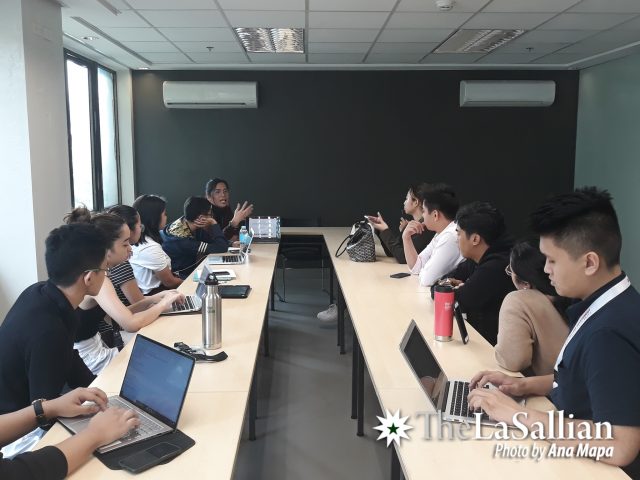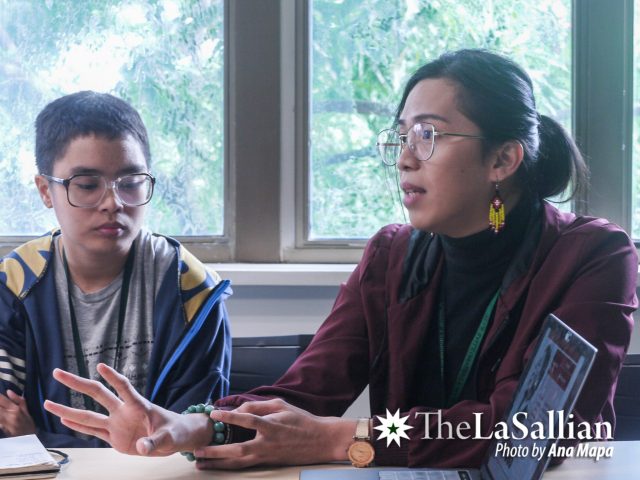The recent approval of a four percent tuition fee increase by University sectors has sparked discussion among students of the University. Members of the University Student Government (USG) met with students and representatives of One La Salle for Human Rights and Democracy (OLFHRD) and the National Union of Students of the Philippines (NUSP) for a University-wide consultation last February 13 at the USG Session Hall, third floor of the Br. Connon Hall.
The annual tuition fee increase will undoubtedly inflate expenses for students. The announced four percent increase tuition fee for Academic Year 2020-2021 was the compromise reached between the USG, who proposed a zero percent increase to keep education expenses fixed, and a seven to eight percent increase pushed for by the faculty, employees association, DLSU Parents of University Students Organization (PUSO), and the administration, citing the need to compensate for the institution’s expenses, including the rising inflation, salaries, facility maintenance, among others.

Situation of education
NUSP National Secretariat Jandeil Roperos led the consultation and shared her insights on the current situation of education in the Philippines and the annual rise in tuition fees across the country.
Roperos claimed that the state of education in the country is deteriorating due to “neoliberal” policies and the privatization of education services. According to her, neoliberalism has caused the government to shy away from its responsibility to provide education to its citizens and shares it instead with the private sector. Roperos criticized that the “the mindset of the private sector is profit” and claimed that “basic social services are being commodified”.
According to Republic Act (RA) 6728, or the Government Assistance to Students and Teachers in Private Education Act, which regulates tuition fee increases, 70 percent of the tuition fee increase must be allocated to the salaries of both teaching and non-teaching personnel, 20 percent to facility improvements, and 10 percent as a return on investment for stockholders if the school or university is a stock corporation or to its operation and facilities if it is not. However, she asserted that despite the tuition fee increases, some institutions do not allocate their income according to the law, and that it is reflected on the effectiveness of their facilities and services.
Aside from the privatization of the education sector, Roperos claimed that the Philippine government has not been able to distribute its P40-billion budget allocation for state universities and colleges. Caraga State University in Agusan Del Norte, Roperos said, has not yet received its share from the government’s education budget, forcing the university to increase even non-tuition fees such as laboratory fees just to offset their expenses.
RA 6728 also stipulated that tuition fee increases of institutions should be approved by all sectors of the University, including its students, represented by their student government. “Dapat malaki yung boses ng estudyante since sila ang pinakamalaking sector sa University. Dapat kinokonsider ’yung grievances nung students,” Roperos argued.
(The student body must have a strong voice because they are the largest sector in the University. Student grievances must be taken into consideration.)

Moving forward
Members of the USG also shared their sentiments on the tuition fee increase. College of Liberal Arts (CLA) College President Pepeton Felipe declared that he was not in favor of the increase given how several courses in the college, such as the Communication Arts program, are burdened with some of the highest expenditures for thesis which compounds their expenses. “From our perspective, having one of the courses that really spends a lot on our thesis, we’re not really for the tuition fee increase [and] as part of the USG, we’ve been fighting for the zero percent increase,” Felipe explained.
He also mentioned that other factors, like the inflation rate, must be taken into consideration when deciding on the rate of tuition fee increase. To lessen the financial burden experienced by CLA students, Felipe reiterated that the Arts College Government is offering thesis grants and subsidizing printing costs.
Discussions shifted to creating action plans that would increase student awareness on the approved tuition increase. Chairperson for USG Affairs Maxine Pampolina proposed creating a manual for tuition fee increases. The proposed manual would detail ways for the University administration to communicate information with students and the USG regarding the tuition fee increase. The guidelines would also then be mandatory for the administration. The proposed manual, however, would first be submitted to the University administration for review.
Felipe agreed with Pampolina’s proposal, drawing similarities to a communications manual, saying that the effort could help bridge the gap between the administration and the students with for future tuition fee increases.
